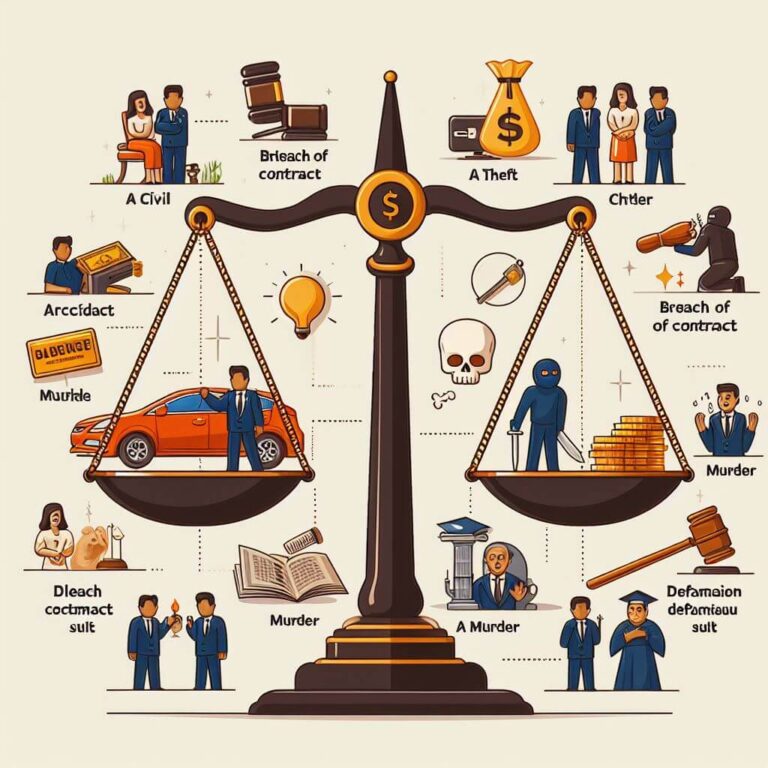This article talks about Penalties For Different Types Of Criminal Offenses
Introduction
In India, the law is strict when it comes to criminal offenses. The Indian Penal Code (IPC), along with other specific laws, lays down the penalties for various crimes. Understanding these penalties is crucial for everyone, as it helps in being aware of the consequences of unlawful actions. This article aims to simplify and explain the penalties for different types of criminal offenses under Indian law.
Penalties For Different Types Of Criminal Offenses In Indian Law
Understanding Criminal Offenses
Criminal offenses in India are broadly categorized into three types: petty offenses, serious crimes, and heinous crimes. Let’s dive deeper into each category and understand the penalties associated with them.
Petty Offenses
Petty offenses are minor crimes, often punishable by fines or short-term imprisonment. Examples include minor theft, simple hurt, and public nuisance. The penalties for these offenses are usually less severe, aiming more at correcting the behavior rather than harsh punishment.
Examples and Penalties
- Simple Hurt: Punishable by up to one year in prison, a fine, or both.
- Public Nuisance: Small fines or warnings are common penalties.
Serious Crimes
Serious crimes include offenses that are considered more severe than petty offenses but less severe than heinous crimes. These crimes can lead to significant jail time and fines.
Examples and Penalties
- Theft: Depending on the value of stolen goods, imprisonment can range from three years to seven years, along with a fine.
- Fraud: Punishable by imprisonment up to two years, a fine, or both.
Heinous Crimes
Heinous crimes are the most severe offenses, often involving violence or grave harm to individuals or society. These crimes carry the harshest penalties, including long-term imprisonment and even the death penalty.
Examples and Penalties
- Murder: Can lead to life imprisonment or the death penalty.
- Rape: Punishment ranges from seven years of imprisonment to life imprisonment, depending on the severity and circumstances.
Legal Procedures and Rights
It’s important to note that the legal process in India ensures that the accused have their rights protected, including the right to a fair trial and legal representation. The aim is not just to punish but also to rehabilitate and prevent further crimes.
Conclusion
Understanding the penalties for different types of criminal offenses in Indian law helps in fostering a law-abiding society. It’s crucial for individuals to be aware of these laws to avoid unintended violations and to promote a safe and secure environment for everyone. The essence of this knowledge is not just in knowing the law but in appreciating the value of living in harmony within the legal frameworks that govern us.
FAQ on Penalties for Different Types of Criminal Offenses in Indian Law
1. What is a petty offense?
Petty offenses are minor crimes that usually result in fines or short-term imprisonment, such as minor theft or causing a public nuisance.
2. Can you get jailed for a petty offense?
Yes, petty offenses can lead to short-term imprisonment, depending on the crime’s nature and circumstances.
3. What is considered a serious crime in India?
Serious crimes include offenses like theft, fraud, and assault, which carry heavier penalties than petty offenses, including longer imprisonment terms and larger fines.
4. What is the penalty for theft in India?
The penalty for theft can range from three to seven years of imprisonment, along with a fine, depending on the stolen goods’ value.
5. Are fraud crimes heavily penalized in India?
Yes, fraud can lead to up to two years of imprisonment, a fine, or both, depending on the fraud’s severity and impact.
6. What constitutes a heinous crime?
Heinous crimes are severe offenses that involve violence or grave harm, such as murder or rape, and carry the harshest penalties.
7. What is the punishment for murder in India?
Murder can lead to life imprisonment or the death penalty, depending on the case’s specifics.
8. Can rape result in a death penalty?
In extreme cases, such as gang rape or rape leading to the victim’s death, the perpetrators can face the death penalty.
9. What rights do accused individuals have in India?
Accused individuals have rights to a fair trial, legal representation, and protection against self-incrimination, among others.
10. Are penalties for criminal offenses the same across India?
Yes, the IPC provides a standardized set of penalties, although local laws and circumstances can influence the outcome.
11. How is public nuisance punished?
Public nuisance typically results in small fines or warnings, depending on the disturbance caused.
12. What is the penalty for simple hurt?
Simple hurt can lead to up to one year in prison, a fine, or both.
13. Can you appeal against a criminal offense penalty?
Yes, individuals convicted of a crime can appeal to higher courts for a review of the decision.
14. Are juvenile offenders treated differently?
Yes, juvenile offenders are dealt with under the Juvenile Justice Act, focusing on rehabilitation rather than punishment.
15. What is the punishment for cyber crimes?
Cyber crimes can result in imprisonment, fines, or both, depending on the crime’s nature and severity.
16. Is bail possible for serious crimes?
Bail is possible for some serious crimes, but it depends on factors like the nature of the crime and the accused’s background.
17. What is the penalty for drug trafficking?
Drug trafficking carries severe penalties, including long-term imprisonment and substantial fines.
18. Can defamation lead to imprisonment?
Yes, defamation can lead to up to two years in prison, a fine, or both.
19. Are penalties for white-collar crimes severe?
Yes, white-collar crimes can lead to significant imprisonment and fines, reflecting the economic damage they cause.
20. What happens if you resist arrest?
Resisting arrest can lead to additional charges, including imprisonment and fines.
21. Can you be punished for attempting to commit a crime?
Yes, attempted crimes can also lead to penalties, though usually less severe than for completed crimes.
22. Is domestic violence heavily penalized?
Domestic violence is punishable by law, including imprisonment and fines, to protect victims and deter perpetrators.
23. What is the punishment for kidnapping?
Kidnapping can lead to long-term imprisonment, depending on the case’s specifics.
24. Are environmental crimes taken seriously?
Yes, environmental crimes can lead to imprisonment, fines, or both, highlighting the importance of protecting the environment.
25. What is the penalty for insider trading?
Insider trading is considered a serious offense, punishable by imprisonment and hefty fines.
26. Can you be punished for conspiracy to commit a crime?
Yes, conspiring to commit a crime can lead to penalties, even if the crime was not ultimately committed.
27. What are the penalties for bribery and corruption?
Bribery and corruption offenses can result in imprisonment, fines, and disqualification from holding public office.
28. How does Indian law penalize animal cruelty?
Animal cruelty offenses can lead to fines, imprisonment, or both, emphasizing animal welfare.
29. What are the consequences of driving under the influence (DUI)?
DUI can lead to imprisonment, fines, and suspension of driving licenses.
30. Are penalties for crimes against women stricter?
Yes, crimes against women, such as rape or domestic violence, carry strict penalties to protect women’s rights and safety.
















